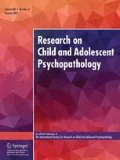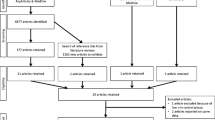Abstract
The efficacy of Toddler-Parent Psychotherapy (TPP) as a preventive intervention for fostering cognitive development in the offspring of depressed mothers was evaluated. Mothers with major depressive disorder and their toddlers were randomly assigned to TPP (n = 43) or to a nonintervention group (n = 54) and compared to a control group (n = 61) of women with no current or past mental disorder. At baseline (age 20 months), the groups did not differ on the Bayley Mental Development Index. At post-intervention follow-up (age 3 years), a relative decline in IQ was found in the depressed nonintervention group, whereas the depressed intervention and the normal control groups continued to be equivalent, with higher WPPSI-R Full Scale and Verbal IQs. The worst outcome was found among nonintervention children whose mothers had subsequent depressive episodes. The results confirm the developmental risks faced by offspring of depressed mothers and support the efficacy of the preventive intervention in safeguarding successful cognitive development in at-risk youngsters.
Similar content being viewed by others
REFERENCES
Abramson, L., Metalsky, G., & Alloy, L. (1989). Hopelessness theory of depression: A theory-based subtype of depression. Psychological Review, 9, 358-372.
American Psychiatric Association. (1987). Diagnostic and statistical manual of mental disorders (3rd edition, revised): DSM-III-R. Washington, DC: Author.
American Psychiatric Association. (1994). Diagnostic and statistical manual of mental disorders (4th ed.). Washington, DC: Author.
Bayley, N. (1969). The Bayley scales of infant development. New York: Psychological Corporation.
Beardslee, W. R., Versage, E. M., & Gladstone, T. R. G. (1998). Children of affectively ill parents: A review of the past 10 years. Journal of the American Academy of Child and Adolescent Psychiatry, 37, 1134-1141.
Beck, A. T. (1967). Depression: Clinical, experimental, and theoretical aspects. New York: Harper & Row.
Beck, A. T., Steer, R., & Garbin, M. (1988). Psychometric properties of the Beck Depression Inventory: Twenty-five years of evaluation. Clinical Psychology Review, 8, 77-100.
Beck, A. T., Ward, C. H., Mendelson, M., Mock, J., & Erbaugh, J. (1961). An inventory for measuring depression. Archives of General Psychiatry, 4, 561-571.
Beeghly, M., & Cicchetti, D. (1994). Child maltreatment, attachment and the self system: Emergence of an internal state lexicon in toddlers at high social risk. Development and Psychopathology 6, 5-30.
Bretherton, I., & Beeghly, M. (1982). Talking about internal states: The acquisition of an explicit theory of mind. Developmental Psychology, 18, 906-921.
Bumberry, W., Oliver, J. M., & McClure, J. (1978). Validation of the Beck Depression Inventory in a university population using psychiatric estimate as a criterion. Journal of Consulting and Clinical Psychology, 46, 150-155.
Campbell, S. B., Cohn, J. F., Flanagan, C., & Popper, S. (1992). Course and correlates of postpartum depression during the transition to parenthood. Development and Psychopathology, 4, 29-47.
Campbell, S. B., Cohn, J. F., & Meyers, T. (1995). Depression in firsttime mothers: Mother infant interaction and depression chronicity. Developmental Psychology, 31, 349-357.
Cicchetti, D. (1990). The organization and coherence of socioemotional, cognitive, and representational development: Illustrations through a developmental psychopathology perspective on Down Syndrome and child maltreatment. In R. Thompson (Ed.), Nebraska Symposium on Motivation, Vol. 36. Socioemotional development (pp. 259-366). Lincoln, Nebraska: University of Nebraska Press.
Cicchetti, D., & Aber, J. L. (1986). Early precursors to later depression: An organizational perspective. In L. Lipsitt & C. Rovee-Collier (Eds.), Advances in infancy, Vol. 4 (pp. 81-137). Norwood, NJ: Ablex.
Cicchetti, D., Rogosch, F. A., & Toth, S. L. (1997). Ontogenesis, depressotypic organization, and the depressive spectrum. In S. S. Luthar, J. Burack, D. Cicchetti, & J. Weisz (Eds.), Developmental psychopathology: Perspectives on adjustment, risk, and disorder (pp. 273-313). New York: Cambridge University Press.
Cicchetti, Rogosch, F. A., Toth, S. L., & Spagnola, M. (1997). Affect, cognition, and the emergence of self-knowledge in the toddler offspring of depressed mothers. Journal of Experimental Child Psychology, 67, 338-362.
Cicchetti, D., & Schneider-Rosen, K. (1986). An organizational approach to childhood depression. In M. Rutter, C. Izard, & P. Read (Eds.), Depression in young people, clinical and developmental perspectives (pp. 71-134). New York: Guilford.
Cicchetti, D., & Toth, S. L. (1995). Developmental psychopathology and disorders of affect. In D. Cicchetti & D. Cohen (Eds.), Developmental psychopathology, Vol. 2: Risk, disorder, and adaptation (pp. 369-420). New York: Wiley.
Cicchetti, D., & Toth, S. L. (1998). The development of depression in children and adolescents. American Psychologist, 53, 221-241.
Cicchetti, D., Toth, S. L., & Rogosch, F. A. (1999). Toddler-parent psychotherapy as a preventive intervention to alter attachment organization in offspring of depressed mothers. Attachment and Human Development, 1, 34-66.
Cogill, S., Caplan, H., Alexandra, H., Robson, K., & Kumar, R. (1986). Impact of maternal postnatal depression on cognitive development. British Medical Journal, 292, 1165-1167.
Cooper, P., & Murray, L. (1997). The impact of psychological treatments of postpartum depression on maternal mood and infant development. In L. Murray & P. Cooper (Eds.), Postpartum depression and child development (pp. 201-220). New York: Guilford.
Coster, W. J., Gersten, M. S., Beeghly, M., & Cicchetti, D. (1989). Communicative functioning in maltreated toddlers. Developmental Psychology, 25, 1020-1029.
Cummings, E. M., & Cicchetti, D. (1990). Attachment, depression, and the transmission of depression. In M. T. Greenberg, D. Cicchetti, & E. M. Cummings (Eds.), Attachment during the preschool years (pp. 339-372). Chicago: University of Chicago Press.
Downey, G., & Coyne, J. C. (1990). Children of depressed parents: An integrative review. Psychological Bulletin, 108, 50-76.
Egeland, B., & Sroufe, L. A. (1981). Developmental sequelae of maltreatment in infancy. New Directions for Child Development, 11, 77-92.
Field, T. M. (1992). Infants of depressed mothers. Development and Psychopathology, 4, 49-66.
Fraiberg, S. (1977). Insights from the Blind. New York: Basic Books.
Fraiberg, S., Adelson, E., & Shapiro, V. (1975). Ghosts in the nursery: A psychoanalytic approach to impaired infant-mother relationships. Journal of the American Academy of Child Psychiatry, 14, 387-421.
Gelfand, D., Teti, D., Seiner, S. A., & Jameson, P. B. (1996). Helping mothers fight depression: Evaluation of a home-based intervention program for depressed mothers and their infants. Journal of Clinical Child Psychology, 25, 406-422.
Gersten, M., Coster, W., Schneider-Rosen, K., Carlson, V., & Cicchetti, D. (1986). The Socioemotional bases of communicative functioning: Quality of attachment, language development, and early maltreatment. In M. E. Lamb, A. L. Brown, & B. Rogoff (Eds.), Advances in developmental psychology (Vol. 4, pp. 105-151). Hillsdale, NJ: Erlbaum.
Hay, D. F., & Kumar, R. (1995). Interpreting the effects of mothers' postnatal depression on children's intelligence: A critique and reanalysis. Child Psychiatry and Human Development, 25, 165-181.
Hollingshead, A. (1975). Four-factor index of social status. Unpublished manuscript. Yale University, New Haven: CT.
Jackson, S. (1986). Melancholia and depression: From hippocratic times to modern times. New Haven: Yale University Press.
Kagan, J. (1981). The second year: The emergence of self-awareness. Cambridge, MA: Harvard University Press.
Kaplan, P. S., Bachorowski, J., & Zarlengo-Strouse, P. (1999). Childdirected speech produced by mothers with symptoms of depression fails to promote associative learning in 4-month-old infants. Child Development, 70, 560-570.
Lee, C. M., & Gotlib, I. H. (1991). Adjustment of children of depressed mothers: A 10-month follow-up. Journal of Abnormal Psychology, 100, 473-477.
Lieberman, A. F. (1991). Attachment theory and infant-parent psychotherapy: Some conceptual, clinical, and research considerations. In D. Cicchetti & S. L. Toth (Eds.), Rochester Symposium on Developmental Psychopathology, Vol. 3: Models and integrations (pp. 261-287). Rochester, NY: University of Rochester Press.
Lieberman, A. F. (1992). Infant-parent psychotherapy with toddlers. Development and Psychopathology, 4, 559-574.
Lyons-Ruth, K., Connell, D., Grunebaum, H., & Botein, S. (1990). Infants at social risk: Maternal depression and family support services as mediators of infant development and security of attachment. Child Development, 61, 85-98.
Miller, W. (1975). Psychological deficit in depression. Psychological Bulletin, 82, 238-260.
Morisset, C., Barnard, K., Greenberg, M., Booth, C., & Spieker, S. (1990). Environmental influences on early language development: The context of social risk. Development and Psychopathology, 2, 127-149.
Murray, L. (1992). The impact of postnatal depression on infant development. Journal of Child Psychology and Psychiatry, 33, 543-561.
Murray, L., Fiori-Cowley, A., Hooper, R., & Cooper, P. (1996). The impact of postnatal depression and associated adversity on early mother-infant interactions and later infant outcome. Child Development, 67, 2512-2526.
Murray, L., Hipwell, A., Hooper, R., Stein, A., & Cooper, P. (1996). The cognitive development of 5-year-old children of postnatally depressed mothers. Journal of Child Psychology and Psychiatry, 37, 927-935.
Murray, L., Kempton, C., Woolgar, M., & Hooper, R. (1993). Depressed mothers' speech to their infants and its relation to infant gender and cognitive development. Journal of Child Psychology and Psychiatry, 34, 1083-1101.
NICHD Early Child Care Research Network (1999). Chronicity of maternal depressive symptoms, maternal sensitivity, and child functioning at 36 months. Developmental Psychology, 35, 1297-1310.
Piaget, J. (1954). The construction of reality in the child (2nd edition). New York: Basic Books.
Radke-Yarrow, M., Belmont, B., Nottelmann, E., & Bottomly, L. (1990). Young children's self-conceptions: Origins in the natural discourse of depressed and normal mothers and their children. In D. Cicchetti & M. Beeghly (Eds.), The self in transition (pp. 345-361). Chicago: University of Chicago Press.
Robins, L., Helzer, J., Orvaschel, H., Anthony, J., Blazer, D., Burnam, A., & Burke, J. (1985). The Diagnostic InterviewSchedule. In W. Eaton & L. Kessler (Eds.), Epidemiologic field methods in psychiatry (pp. 143-170). New York, NY: Academic Press.
Ryan, R., Deci, E., & Grolnick, W. (1995). Autonomy, relatedness, and the self: The relation to development and psychopathology. In D. Cicchetti & D. Cohen (Eds.), Developmental psychopathology, Volume 1: Theory and methods (pp. 618-655). New York: Wiley.
Sameroff, A. J., Seifer, R., Barocas, R., Zax, M., & Greenspan, S. (1987). Intelligence quotient scores of 4 year children: Socialenvironmental risk factors. Pediatrics, 79, 343-350.
Sharp, D., Hay, D., Pawlby, S., Schmucker, G., Allen, H., & Kumar, R. (1995). The impact of postnatal depression on boys' intellectual development. Journal of child psychology and Psychiatry, 36, 1315-1336.
Teti, D. M., Gelfand, D. M., Messinger, D. S., & Isabella, R. (1995). Maternal depression and the quality of early attachment: An examination of infants, preschoolers, and their mothers. Developmental Psychology, 31, 364-376.
Wechsler, D. (1989). Wechsler Preschool and Primary Scale of Intelligence-Revised Manual. San Antonio: The Psychological Corporation.
Weissman, M. M., & Paykel, E. S. (1974). The depressed woman: A study of social relationships. Chicago: University of Chicago Press.
Weissman, M. M., Warner, V., Wickramaratne, P., Moreau, D., & Olfson, M. (1997). Offspring of depressed parents 10 years later. Archives of General Psychiatry, 54, 932-940.
Author information
Authors and Affiliations
Rights and permissions
About this article
Cite this article
Cicchetti, D., Rogosch, F.A. & Toth, S.L. The Efficacy of Toddler-Parent Psychotherapy for Fostering Cognitive Development in Offspring of Depressed Mothers. J Abnorm Child Psychol 28, 135–148 (2000). https://doi.org/10.1023/A:1005118713814
Issue Date:
DOI: https://doi.org/10.1023/A:1005118713814




